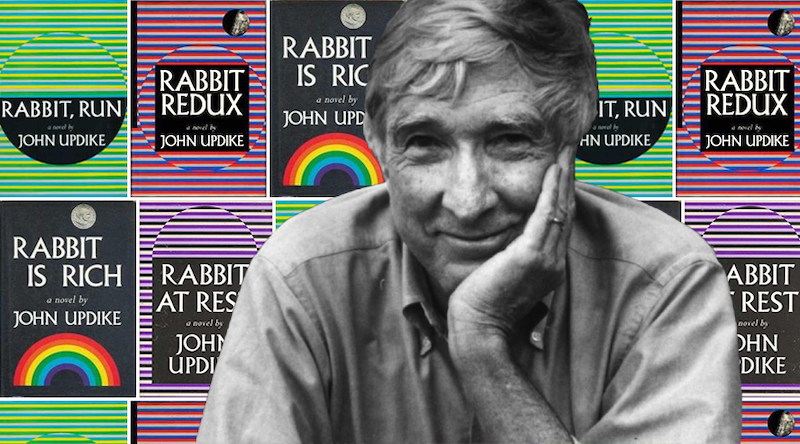The “Book Marks” website celebrated what would have been John Updike’s 87th birthday with a list of early reviews to the “Rabbit” novels for which the author is most famous. Here are a few of them:
“Rabbit, Run is a tender and discerning study of the desperate and the hungering in our midst. A modest work, it points to a talent of large dimensions—already prove in the author’s New Yorker stories and his first novel, The Poorhouse Fair, John Updike, still only 28 years old, is a man to watch.”
–David Boroff, The New York Times, November 6, 1960
“There is a great deal in Rabbit Redux, but only because John Updike has put it there. There is more activity than purposefulness: an intricate scheme of parallelisms with the moon shot; a rich (but in the end funked or slighted) sense of possible parallels between oral sex and verbalism or certain verbal habits; likewise a sense of parallels between the job of linotyping and the job of writing. The book is cleverer than a barrel full of monkeys, and about as odd in its relation of form to content. It never decides just what the artistic reasons (sales and nostalgia are another matter) were for bringing back Rabbit instead of starting anew; its existence is likely to do retrospective damage to that better book Rabbit, Run.”
–Christopher Ricks, The New York Review of Books, December 16, 1971

“If Rabbit Is Rich has a central theme it has to do with the one-directional nature of life: life, always waiting to be death. Rabbit swans on down the long slide, clumsy, lax and brutish, but vaguely trying.
“The technical problem posed by Rabbit is a familiar and fascinating one. How to see the world through the eyes of the occluded, the myopic, the wilfully blind? At its best the narrative is a rollicking comedy of ironic omission, as author and reader collude in their enjoyment of Rabbit’s pitiable constriction. Conversely, the empty corners and hollow spaces of the story fill with pathos, the more poignant for being unremarked.”
–Martin Amis, The Observer, January 17, 1982
“Rabbit at Rest is certainly the most brooding, the most demanding, the most concentrated of John Updike’s longer novels. Its courageous theme—the blossoming and fruition of the seed of death we all carry inside us—is struck in the first sentence … This early note, so emphatically struck, reverberates through the length of the novel and invests its domestic-crisis story with an unusual pathos. For where in previous novels, most famously in Couples (1968), John Updike explored the human body as Eros, he now explores the body, in yet more detail, as Thanatos. One begins virtually to share, with the doomed Harry Angstrom, a panicky sense of the body’s terrible finitude, and of its place in a world of other, competing bodies: ‘You fill a slot for a time and then move out; that’s the decent thing to do: make room.’”
–Joyce Carol Oates, The New York Times, September 30, 1990
“The centerpiece of [Licks of Love]—and the one compelling reason to read it—is a novella-length piece called ‘Rabbit Remembered,’ a sad-funny postscript to Mr. Updike’s quartet of Rabbit novels, which takes up the story of Harry (Rabbit) Angstrom’s family and friends as they try to come to terms with his death and chart the remainder of their own lives.
“As in his last Rabbit novel, Mr. Updike writes with fluent access to Harry Angstrom’s world, chronicling the developments in his hero’s small Pennsylvania hometown with the casual ease of a longtime intimate. With compassion and bemused affection, he traces the many large and small ways in which Harry’s actions continue to reverberate through the lives of his widow, Janice, and their son, Nelson, and the equally myriad ways in which their decisions are influenced, consciously or unconsciously, by their memories of him.
